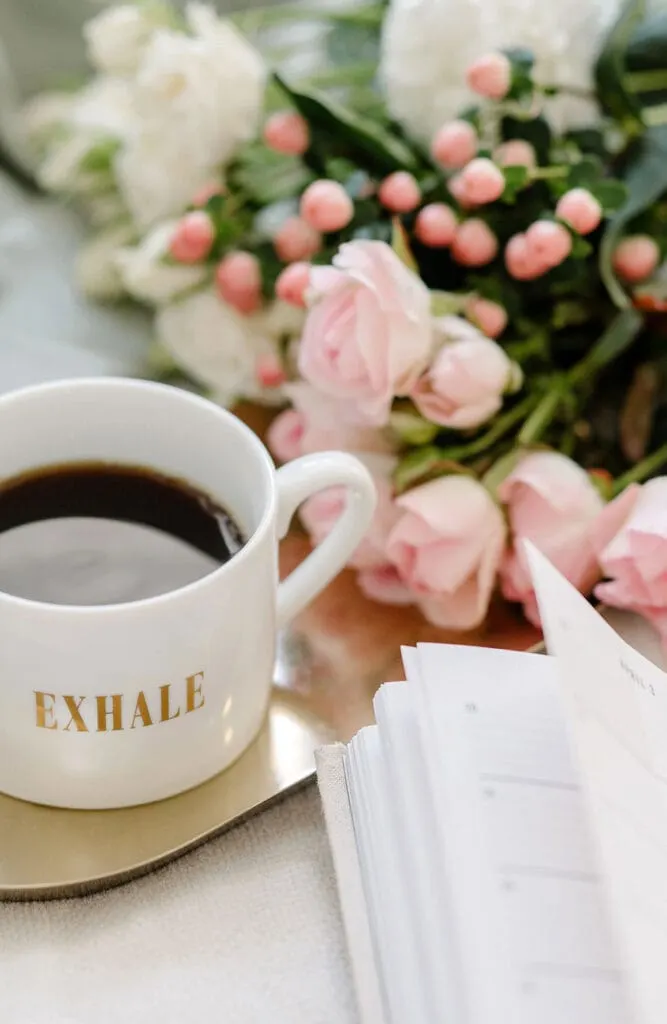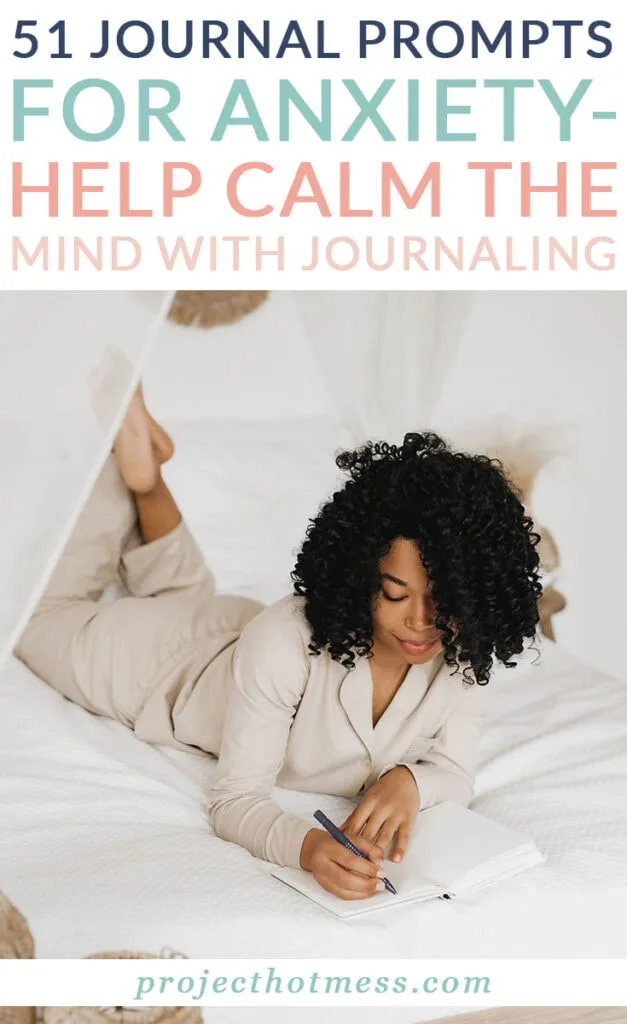The idea of journaling to help calm anxious thoughts is not a new concept. In fact, it has been studied for many years as a great way to affect positive change in those who have had a difficult time with anxiety and who may have sought professional help.
And while we wholeheartedly know that seeking professional help for conditions such as anxiety are immensely beneficial, there are steps you can take to help ease your anxiety at home, that you can initiate at any time of the day, and that can help you feel like you can regain some control over your anxious mind.
Journaling is one of those ways.
Of of the good things about journaling is that there is no right or wrong way to do it.
You can simply brain dump all the things going around in your mind (negative thoughts, positive thoughts, anything) and get them all onto a page. This simple act can be relieving on its own.
You can also use journal prompts for anxiety, such as those listed below, that are specifically designed to help you direct your mind to process its anxious thoughts and work through your thoughts in a powerful way.
Does Journaling Really Work To Calm Anxiety?
The therapeutic benefits of journaling aren’t a simple placebo effect. Journaling has been examined in several scientific studies as a way to help treat anxiety disorder and has been found in some cases to provide an effective way to contribute towards the management of anxiety.
Journaling has also been found to be beneficial to those who suffer from anxiety related to other conditions such as multiple sclerosis (this study looked at the impacts of journaling on anxiety and stress in patients with MS), as well as non-medical related events such as stress associated with schooling and education.
Studies repeatedly show the benefits associated with journal writing and anxiety (including chronic anxiety).

How Often Should You Be Journaling To See The Benefits?
While a good journaling session can make you feel a whole lot better, research suggests that you should be journaling daily in order to really reap the rewards.
Journaling daily is correlated with significant decreases in stress and anxiety symptoms
Mindful journal writing can actually increase the amount of gray matter in the neural pathways of your brain, which could make you more resilient.
Journaling has also been shown to improve sleeping patterns, which can be particularly helpful for those who suffer from insomnia due to anxious thoughts.
Considering the benefits of journaling are so great and widespread in many areas of your life, you should be aiming for a daily journaling practice for 30 days to help formulate the habit associated with journaling and to really feel the benefits in your life.
When Should You Be Journaling?
There’s no particular time of day that is a clear winner for your daily journaling practice, however in order to stick with it, adding journaling into your daily routine is the best way to go.
To do this, link your journaling practice with something you already do each day.
For example, if you make yourself a coffee every morning, sit down with your journal or your journaling prompts and write while drinking your coffee.
You can also grab your journal and start writing if you notice any feelings of anxiety or negative emotions creeping in.
How To Journal For Anxiety
As mentioned earlier, when it comes to journaling, there’s really no right or wrong way to do it.
You can use the journaling prompts for anxiety listed below but you don’t have to physically write your answers. While these journaling prompts stop you from having to look at a blank page to start, the idea of writing your thoughts can be a little daunting for some when starting.
Instead, you could try:
- recording a video of your answers
- recording an audio of your response
- painting your response
- drawing your response
- writing a song in response
Or any other creative means of responding to the prompts.

Journal Prompts For Anxiety
Use the journaling prompts below as a starting point for journaling through anxiety.
After a while, you may find that you’d like to try writing your own prompts or that you no longer need prompts and can free-write or creatively express yourself on your own.
Try these journaling prompts:
1 – How does your stress and anxiety feel within your body?
Where you can feel it? How does it feel? Is it in one place or does it move around?
Learning to identify how anxiety shows in your body can help you to understand when anxiety is building up and create steps to manage anxiety quickly.
2 – List 3 things that are making you feel anxious right now.
Oftentimes the simple act of writing your fears down can cause these fears to lose their power. They don’t seem quite so bad when they’re written down in front of you.
Be open and honest about these fears, this practice is for you and the more honest you are, the more insightful this can be.
3 – What do your thoughts say when you’re suffering from anxiety?
It can help to write out what those negative thoughts are telling you because it gives you the opportunity to clear up misinformation and challenge that thinking.
Journaling about challenging your thoughts is a process that’s been used by therapists to help clients learn to manage their anxiety and stress better.
You can find out more about Cognitive Behavioural Therapy Journaling and include these practices when trying to challenge negative thoughts.

4 – What is causing you stress right now?
This can be something that’s happened recently or something more long-standing.
Journaling about what has been stressing you out over time can help give you insight into your triggers for stress and anxiety.
5 – How does the world look when you’re feeling anxious?
Journal about what your external world looks like when you’re feeling anxious.
What does it look like to others?
Journaling about how reality can feel different when you are experiencing stress or anxiety may help clear some confusion.
6 – What would you say to someone who was feeling the way that you feel?
What would you say to yourself if you were feeling this way?
Journaling about how you respond to others and yourself can give you insight into how your anxiety is impacting your thoughts and behaviors.
7 – What makes you happy?
Many people often answer their family or their children make them happy, but these are obvious answers. Dive a little deeper and ask yourself what makes you happy. What makes you truly, grinning from ear to ear, inner peace kind of happy?
8 – Journal about a happy memory that brings you joy and peace when thinking about it.
Sometimes journaling for anxiety can feel heavy, like you are always dragging up uncomfortable feelings (that’s how it is supposed to feel, it’s okay). But be sure to break this heavy feeling up with happy journaling moments too.
Think about a happy memory or a happy time in your life that makes you feel joyful and at peace when thinking about it. When was it, where were you? Share all the details.

9 – Journal about what you can do to feel better right now.
This may be something like calling a friend, walking the dog or listening to music.
Journaling about how you can take care of yourself when you’re feeling anxious is important.
This way, when you are experiencing these difficult emotions, you have a little guidance on how to take care of yourself in that moment.
10 – Journal about what you need right now.
Self-care is so important when we are experiencing anxiety. Journaling about what you need can help get the self-care ball rolling and assist with managing difficult emotions.
It’s also important to understand our own needs and what is required to help us function.
Some people need time alone while others need interactions, some people need quiet while others need noise. What do you need?
11 – Journal about how your body feels.
This is a particularly good prompt to use at a time when you are feeling anxious.
Pay attention to your body, starting at your head and working your way down.
Where are you feeling tight? Is your jaw clenched? Are your shoulders tensed? What would happen if you breathed into that tense or tight place right now.
Journaling about the physical feelings of anxiety can help teach us how to soothe our bodies when we feel these emotions taking over.
12 – Journal about what triggers your anxiety.
Journaling about what sets off your difficult emotions can be key to identifying things that may set them off in the future and understanding how to manage these emotions better.
Oftentimes people know at least a few triggers for their anxiety, but writing about them can enlighten us to more than we realized.
The goal is to recognize any specific trigger that may contribute to your anxiety attacks and be able to introduce a pattern disruptor (like journaling) to shift our anxious minds.
13 – Journal about why you’re scared of letting go of this feeling.
When we experience difficult emotions, it’s natural for us to want to hold onto them because often they’ve been with us for a while and they feel like old friends (or enemies, depending on how you look at them). Journaling about why we are scared of letting go of these emotions can bring some insight into this fear.

14 – Journal about what it would feel like to let go.
What would happen if you allowed yourself to release these feelings?
Journaling about the physical feeling of letting go is an enlightening process that many people find helpful in learning how to let go.
15 – Journal about what lessons anxiety brings up for you.
Journaling about all that anxiety has taught us can be a very healing experience as many people have learned so much from their difficult emotions.
Oftentimes we know more than we give ourselves credit for because our brains work so hard to protect us and keep us safe.
16 – Journal about what you can change in your life so that you no longer need these feelings.
Journaling about all the ways we can improve our lives is a great exercise as it shows us how powerful we really are and how much control we have over our own lives, even if it doesn’t seem like it at the time.
Journaling about things that trigger or exacerbate our anxiety can help immensely as well as journaling about changes we’d like to make in those situations.
17 – Journal a letter to the person who has supported you the most in your life.
This letter can really be written to anyone who has been supportive of you, even if they are not physically present.
Journaling about what this person means to you can be a deeply touching experience that reminds us of all the important people in our life who have shaped us into the person we are today.
18 – Journal about your goals for the future.
Journaling about all the goals you have for yourself is a fantastic exercise as it really lets us know what we want out of life and where we’d like to go.
Journaling about what life will feel like after achieving these goals can help visualize how wonderful life can be after reaching our goals.
19 – Journal about your dreams.
This one is particularly good if you are anxious because anxiety tends to drag people into mundane thoughts, worries, and tasks that aren’t always associated with dreaming big or thinking of anything beyond today’s plans.
Journaling about all the dreams you have inside of you can be very liberating as it shows us what fantastic things are possible in this world.

20 – Journal about your first memory, especially if it’s a soothing one.
Journaling about our first childhood memories can be very interesting as we can look back and see how far we’ve come in life, even just from an early age.
Journaling about the feelings that this memory brings up is also a powerful experience because often these memories come with intense emotions that we may not have felt before.
21 – Journal about your last memory.
This can be a very interesting exercise as we often think of our past in ways that rehash the same memories and feelings over and over again.
Journaling about how you felt when making this memory will show you things about yourself that you didn’t realize before.
22 – Journal about what makes you feel safe or secure at this moment.
While it may be anxiety-provoking to journal about what makes us feel insecure, writing down all the things that make us feel safe is also an interesting experience because oftentimes people don’t take the time to think of these things on their own.
23 – Journal why something doesn’t scare you even if others might find it scary.
Journaling about things that don’t scare us can be a very useful experience because sometimes anxiety makes us feel like we’re afraid of everything, even though that’s not the case.
Journaling about why this thing isn’t scary at all helps to remind ourselves of all these reasons and really brings true peace of mind.
24 – Journal what you appreciate most about yourself.
Journaling about ourselves is always a great exercise as it shows us how strong we are over time and helps to build self-esteem so we can truly learn to love ourselves for who we are.
Journaling about the best qualities in ourselves is a rewarding experience as well as journaling about our dreams and aspirations, especially if they have little to do with our day-to-day lives.
25- Journal about an experience you’ve had that changed your perspective.
Journaling about life experiences that have shown us the power of perspective can be a very deep and moving exercise as it really helps us to see how much control we have over our perspective on life.
This is particularly good for anxious people because anxiety often makes us feel like there’s no way out or nothing we can do, so journaling about all the ways in which our perspective has changed will show us every single solution to our problems.

26 – Journal about someone who inspires you or who you admire greatly.
Much like journaling about why something doesn’t scare you, writing down exactly why this person is inspiring gives us great motivation to realize that we, too, can become inspiring people for others.
This is a great exercise because it also helps us feel grateful for this person and all the examples they’ve shown us by journaling about what makes them so special to us.
27 – Journal about your most recent memory with this person.
While writing down everything good about this person, why you admire them, and everything they’ve done inspires you gives great perspective, writing about our last interaction with them can be very powerful as well because it reminds us of their presence in our lives even if we don’t see them often or talk to them every day.
28- Journal three of your worst fears (and why).
Anxious people may struggle with journaling about what scares them because they don’t even know where to start, but this is a very rewarding exercise as it helps us realize the irrationality of our fears.
Writing down exactly why these things are scary can be difficult, but seeing all three on paper will prove that fear isn’t bad as such and is quite a normal response.
Journaling about how these are just normal anxieties and why they’re irrational helps anxious people realize that there’s no reason to fear what they do because they don’t pose any real threat.
Fears are often amplified by anxiety, so seeing exactly what has caused these anxieties is important for taking back control over our thoughts and emotions again.
29 – Journal about your biggest dream or aspiration.
Journaling about big dreams or aspirations can help anxious people who have trouble with smaller achievements see the bigger picture.
Anxious people often have a hard time motivating themselves to do simple tasks so putting everything in perspective by journaling about why these dreams are important helps us see how happy they’ll make us in the long run rather than worrying about the small picture.
30 – Journal about a time you felt on top of the world.
Writing down about how on top of the world we felt can be a very powerful exercise as it reminds us of all our strengths and abilities, which anxiety often makes us feel like we don’t have.
Journaling about why we felt this incredible sensation is also great for reminding us to take control of our anxiety and realize that we’re more than capable of overcoming it.

31 – Journal what you consider to be your greatest strength (and another thing you love about yourself).
Journaling about things that make us strong helps anxious people see their own power instead of feeling like they’re weak or incapable of doing anything right.
Anxious people also tend to put themselves down a lot, which can make it seem like there’s nothing good about them.
Journaling about the best parts of ourselves helps us see that we are capable of being strong even if this is something that our anxiety tries to take away from us.
32 – Journal why you love someone who struggles with anxiety or mental health issues.
Journaling about why we love and care for the people around us who suffer from anxiety is a great exercise because it reminds us to take their feelings into consideration more often.
It’s easy to focus on our own feelings when someone significant in our life suffers from anxiety or depression, but writing down exactly how this person makes us feel every day helps remind us that their mental health isn’t something we need to worry about as much as our own is.
33 – Journal some of your favorite things.
Journaling about what makes us happy can be especially important for anxious people who have trouble realizing what they enjoy because of all the fear surrounding them.
Writing everything down that brings joy into our lives no matter how small is a great way to remind ourselves that there is more than just fear and anxiety in this world and we can still be happy even if we struggle with it.
34 – Journal about the positive things of every negative thought you have.
Journaling about how our anxious thoughts are irrational helps us realize that there’s no reason for us to listen to them anymore because they aren’t true.
It’s easy for anxious people to believe their constant stream of negative, repetitive thoughts, but writing down just one positive thing about each one reminds us that these are just fears and not reality.
35 – Journal about a time you went out of your comfort zone and succeeded.
Going out of our comfort zone is difficult for anxious people, but journaling about what we did right makes us realize that we can do it again even if it seems impossible in the moment.
Our anxiety tries to make going outside our comfort zone seem like a horrible idea, but journaling about how we managed to do it in the past helps us see that it’s possible and not something to worry about.
36 – Journal one way you’d like to improve your anxiety habits.
Journaling about how our anxious habits could be better is a great exercise because it makes us realize when we need to push ourselves outside of our comfort zone for our own sake.
Anxious people regret not doing things they should have because it’s easier to stay quiet and safe inside their comfort zone, but journaling about what we can do differently next time makes us realize that we need to try harder instead of letting anxiety control us.

37 – Journal about all the things you are grateful for right now.
Creating a gratitude journal is a great way to remind ourselves that there is more than just fear and anxiety in the world.
Anxious people tend to focus on all of the bad things happening around them instead of realizing how many good things there are, so journaling about what we’re grateful for helps us see that we need to appreciate these moments and not let our anxiety ruin them.
38 – Journal why you want to live a better life.
Journaling about what we need to do differently in order to make our lives better is a great exercise because it pushes us past our comfort zone and reminds us that living with anxiety isn’t the only option.
Anxious people tend to get stuck in the mindset that living with anxiety is all they can do because it’s safe, but journaling about what we need to change in order to make our lives better helps us start taking steps towards a different life.
39 – Journal a positive message for yourself.
Journaling about our anxiety and depression is a great exercise because it reminds us that we deserve better than what we give ourselves.
Anxious people tend to be self-tormenting in order to push themselves past their comfort zones, but journaling about how much we care helps remind us that we’re worth loving even when it’s hard to see.
When we journal about how much we care about ourselves, our anxiety won’t have as much power over us because we’ll know that deep down we don’t deserve this fear and hate.
40 – Journal all of your thoughts first thing in the morning.
When anxious people wake up, they tend to immediately think about everything that could go wrong in their lives without even considering what is actually happening right now.
Our minds are stuck on the bad things that happened yesterday and the fears of what might happen today, but journaling about what we’re grateful for helps bring us back into reality and remind us that we can choose to live in the present moment.
41 – Journal about what you’re most grateful for in your friends and family.
When anxious people feel alone, journaling about all of the reasons why our loved ones are important helps remind us that we aren’t alone even if it feels like it sometimes.
Our anxiety wants us to believe that we’re alone in this battle against ourselves, but journaling about things like how much our friends and family love us helps remind us that they’re there for a reason.
42 – Journal about a new skill you’d like to learn.
Journaling about new skills we want to learn is a great exercise because it helps us realize that there are things outside of our anxiety that are important.
Anxious people tend to only focus on what they think they can’t do, but journaling about what we’d like to learn makes us see that there are so many fun things outside of our comfort zone.

43 – Journal about how you want to feel at the end of the day.
Anxious people tend to only focus on what they’re feeling now, even if it’s negative, but journaling about how we want to feel by the end of the day is a great way to practice our mental strength.
When anxious people journal about things like gratitude and setting goals, we start to see how much control over our thoughts we actually have and it helps us shift our focus.
Even if we’re not feeling positive by the end of the day, journaling about these thoughts and practices can help us slowly shift into a more optimistic mindset and start looking for things that really matter to us.
44 – Journal the biggest lesson you’ve learned in your life.
When anxious people are stuck in their heads, journaling about what we’ve learned from our life experiences is a great way to look back at everything that has happened.
Anxious thoughts tend to focus on the bad things that have happened even if there were good moments too, but journaling about these lessons lets us see that there’s more to our lives than what we’re feeling right now.
45 – Journal about how you want to feel when you wake up tomorrow morning.
Journaling about the things that we want to change in order to make our lives better is a great exercise because it helps us realize what we can do in order to make this happen.
Anxious people tend to only focus on the negative things that they think will happen tomorrow, but journaling about our goals brings us back into a state of hopefulness and helps put the power in our hands.
46 – Journal about a difficult experience you went through and ended in a positive outcome.
Journaling about our own experiences can be so powerful because it allows us to realize what we’ve already overcome.
Anxious people tend to only focus on the negative things that they think will happen tomorrow, but journaling about our goals brings us back into a state of hopefulness and helps put the power in our hands.
47 – Journal about a time you were very scared but the outcome was not as bad as you expected.
When anxious people focus on their fears, journaling about other times we’ve been beyond terrified but it ended up being alright is a great way to see that what’s happening now isn’t impossible.
Anxious thoughts tend to focus on the bad things that have happened even if there were good moments too, but journaling about our own life experiences helps us realize that some of these fears are only in our self-centered imagination.

48 – Journal about the biggest challenges you face each day.
When anxious people focus on their fears, journaling about other times we’ve been beyond terrified but it ended up being alright is a great way to see that what’s happening now isn’t impossible.
Anxious thoughts tend to focus on the bad things that have happened even if there were good moments too, but journaling about our own life experiences helps us realize that some of these fears are only in our self-centered imagination.
49 – Journal about the things you think keep you from being successful.
When anxious people focus on their fears, journaling about other times we’ve been beyond terrified but it ended up being alright is a great way to see that what’s happening now isn’t impossible.
Anxious thoughts tend to focus on the bad things that have happened even if there were good moments too, but journaling about our own life experiences helps us realize that some of these fears are only in our self-centered imagination.
50 – Journal about what you would do if you never had fear or anxiety ever again.
When anxious people focus on their fears, journaling about other times we’ve been beyond terrified but it ended up being alright is a great way to see that what’s happening now isn’t impossible.
Anxious thoughts tend to focus on the bad things that have happened even if there were good moments too, but journaling about our own life experiences helps us realize that some of these fears are only in our self-centered imagination.
51 – Journal about a list of songs that make you feel calm.
Music is an incredibly powerful tool to help influence our emotions. Write about a list of songs that make you feel calm and safe.
Journaling about the things that we want to change in order to make our lives better is a great exercise because it helps us realize what we can do in order to make this happen.
Remember, when you start your journaling practice, it’s easy to overthink things (which is a particularly good skill of those of us with anxiety). These prompts are designed so you don’t just stare at a blank journal page, and instead offer a better way to get started with your journal entries.
Set yourself a time limit, grab this list of journal prompts and a piece of paper and get writing. Your journal is your safe place, and the best thing is there are no right or wrong answers. Anything you write is perfect for you.
You’ve got this.


